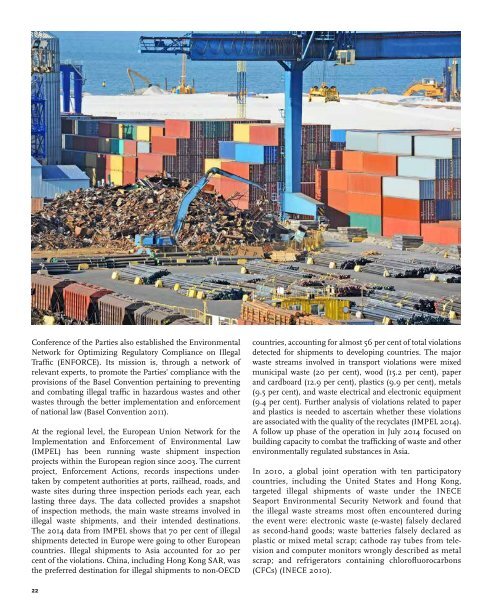WASTE CRIME – WASTE RISKS
6VhhXcA80
6VhhXcA80
Create successful ePaper yourself
Turn your PDF publications into a flip-book with our unique Google optimized e-Paper software.
Conference of the Parties also established the Environmental<br />
Network for Optimizing Regulatory Compliance on Illegal<br />
Traffic (ENFORCE). Its mission is, through a network of<br />
relevant experts, to promote the Parties’ compliance with the<br />
provisions of the Basel Convention pertaining to preventing<br />
and combating illegal traffic in hazardous wastes and other<br />
wastes through the better implementation and enforcement<br />
of national law (Basel Convention 2011).<br />
At the regional level, the European Union Network for the<br />
Implementation and Enforcement of Environmental Law<br />
(IMPEL) has been running waste shipment inspection<br />
projects within the European region since 2003. The current<br />
project, Enforcement Actions, records inspections undertaken<br />
by competent authorities at ports, railhead, roads, and<br />
waste sites during three inspection periods each year, each<br />
lasting three days. The data collected provides a snapshot<br />
of inspection methods, the main waste streams involved in<br />
illegal waste shipments, and their intended destinations.<br />
The 2014 data from IMPEL shows that 70 per cent of illegal<br />
shipments detected in Europe were going to other European<br />
countries. Illegal shipments to Asia accounted for 20 per<br />
cent of the violations. China, including Hong Kong SAR, was<br />
the preferred destination for illegal shipments to non-OECD<br />
countries, accounting for almost 56 per cent of total violations<br />
detected for shipments to developing countries. The major<br />
waste streams involved in transport violations were mixed<br />
municipal waste (20 per cent), wood (15.2 per cent), paper<br />
and cardboard (12.9 per cent), plastics (9.9 per cent), metals<br />
(9.5 per cent), and waste electrical and electronic equipment<br />
(9.4 per cent). Further analysis of violations related to paper<br />
and plastics is needed to ascertain whether these violations<br />
are associated with the quality of the recyclates (IMPEL 2014).<br />
A follow up phase of the operation in July 2014 focused on<br />
building capacity to combat the trafficking of waste and other<br />
environmentally regulated substances in Asia.<br />
In 2010, a global joint operation with ten participatory<br />
countries, including the United States and Hong Kong,<br />
targeted illegal shipments of waste under the INECE<br />
Seaport Environmental Security Network and found that<br />
the illegal waste streams most often encountered during<br />
the event were: electronic waste (e-waste) falsely declared<br />
as second-hand goods; waste batteries falsely declared as<br />
plastic or mixed metal scrap; cathode ray tubes from television<br />
and computer monitors wrongly described as metal<br />
scrap; and refrigerators containing chlorofluorocarbons<br />
(CFCs) (INECE 2010).<br />
22


